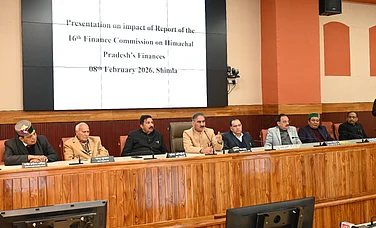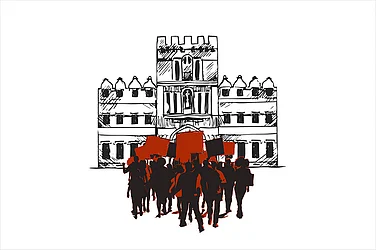The pandemic, as we know it, has not passed as a dark cloud would. Its after-effects still persist in our minds. An alarming instance is the spate of suicides among women in Barmer, a desert district in Rajasthan, which continues to haunt the state. The women of Barmer are committing suicide by jumping into the private wells owned by their families. The multiplier effect, termed copycat suicides, claimed the lives of 54 women in 2020 and 64 in 2021 according to estimates computed by district officials.
A district-wide survey conducted by village heads and teachers reveals that inter-caste marriages, extra-marital affairs, child marriage, harassment by in-laws and domestic violence are to blame. While the unofficial reasons are far too many, the official causes do not unearth the specific context in which women face such atrocities. These causes, in the backdrop of the 24% increase in violence against women in the state of Rajasthan as per police records during the pandemic years (2020-21), reveal the extent of the sustained build-up of psychological pressure on women. This could potentially link up to the reasons for the outbreak of the suicide epidemic in the state. It is now evident that not only public spaces, but the spaces inside rural homes are not safe for women. There is an increased need to analyse the gendered impact of the pandemic on the mental health of rural women in India which is a largely neglected issue.
The district administration of Barmer, however, as a knee-jerk reaction, encouraged the gram panchayats to order that the wells be sealed shut with concrete. The administration was also proactive in installing hand pumps in place of wells and in setting up a 24-hour helpline in 2021 known as the ‘Anmol Jeevan Campaign’ which started receiving calls after its inception.
However, these measures hardly qualify as lasting solutions for the dire problem at hand. While the government does acknowledge the existence of a mental health crisis unfolding in the post-pandemic years, the budgetary allocations for mental health have remained meagre, registering a slight increase from 0.7% in the budget of 2022-2023 to just above 1% in the budget of 2023-24.
The government announced the National Tele Mental Health Programme (NTMHP) in the Union Budget of 2022-23 to further improve access to quality mental health counselling and care services in the country. Tele-MANAS is an integral part of the said programme to prioritise remote and underserved areas in providing free 24/7 tele-mental health services all over the country. According to a reply to an unstarred question in the Lok Sabha as of August 2023, only 42 Tele MANAS cells are functional in states, out of which only one cell is currently functional in the state of Rajasthan.
The continued trend of meagre budgetary allocations results in a corresponding snail-paced development of social infrastructure, in this case, the Tele-MANAS cells. For these cells to supplant the deficiency of the dissemination of mental health services in remote areas, the government should consider community-based mental health interventions.
The problem also appears to be systemic as reflected in the approach adopted by the National Mental Health Programme (NMHP) introduced in the year 1982 to prioritise interventions to treat mental illnesses. The NMHP, although proclaiming inclusivity to ensure the availability of minimum mental care to all, hardly features a women-sensitive approach to the delivery and dissemination of mental health care services.
Many studies have pointed out that the NMHP employs what experts term the biomedical model, which views mental illness as having a physical cause as opposed to the psycho-social model. The latter reasons that other factors like socio-cultural and socio-demographic factors are equally important causes of an underlying mental condition. This proves to be a formidable roadblock to inclusivity as studies have found the biomedical approach to be gender-blind and gender-insensitive. For example, the NMHP largely focuses its interventions on severe disorders such as epilepsy, mental retardation, etc., leaving out common mental disorders such as depression and anxiety which have underlying psychosocial causes. Studies show that women are more susceptible to common mental disorders rooted in a psychosocial context originating from women's work and role in society. Such disproportionate prioritisation, although unintentional, behaves as an impediment to the effective delivery of mental health care services to women. It is also important to upgrade the mandate of the programme in line with recent times to include a gendered perspective.
The most important question is whether telemedicine is as effective as claimed in the post-pandemic hinterland of India. Does the telemedicine model take into account the gendered reality and lives of rural women in India? Mental health continues to be a highly stigmatised reality in rural India. Women, therefore, are less likely to avail mental health services through impersonal mechanisms like helplines. What is needed is a greater emphasis on a community-based, female-centric delivery of mental health services by the state.
The Self-Help Groups (SHGs) in India have emerged as formidable engines of social empowerment for rural women. Findings of a study reveal that women who are part of SHGs are 27% less likely to suffer from mental health ailments than women who are not. It can prove to be incredibly beneficial if the SHGs can be repurposed to achieve community-based group counselling for women in rural areas. This would require fortnightly visits from trained mental health professionals to these SHG meetings. Similar interventions in rural districts of Karnataka have shown that such focused interventions have led to considerable improvements in the mental health of the associated women. Such interventions, apart from relieving psychological stressors, also provide these women with a strong social capital to fall back on. These gatherings can provide women with the necessary support in a socially-approved construct thereby aiding their collective emotional wellbeing.
Community-based mental health interventions are a necessity, as they are designed to be better suited for rural women navigating the exigencies of a post-pandemic India that is still reeling under its impact.
(Prathiksha Ullal is an advocate and currently works as a research fellow with Vidhi, Centre for Legal Policy)























